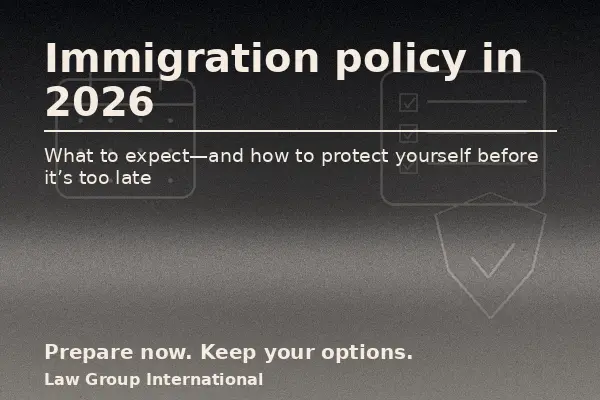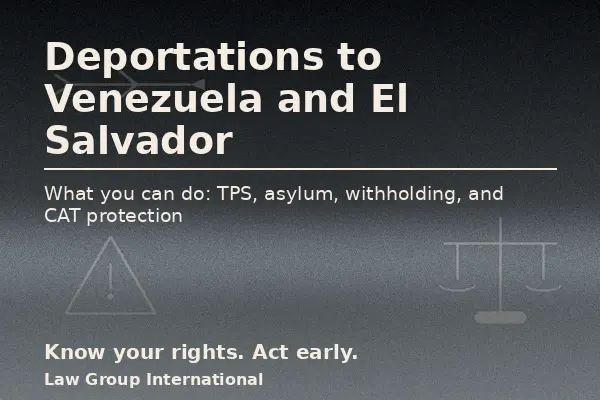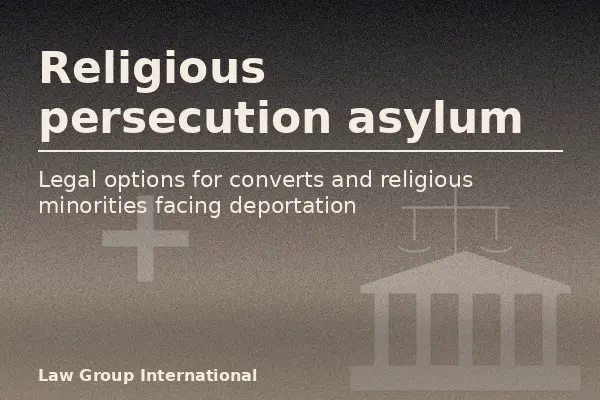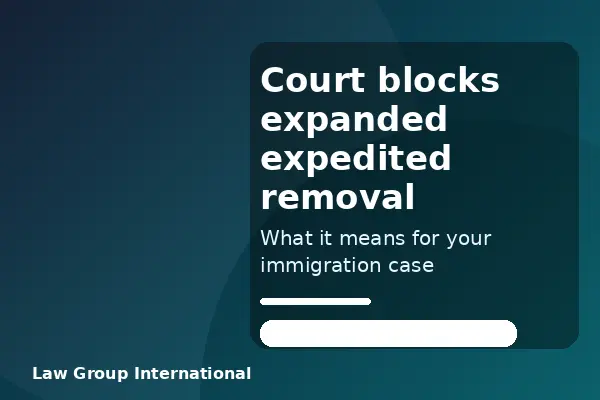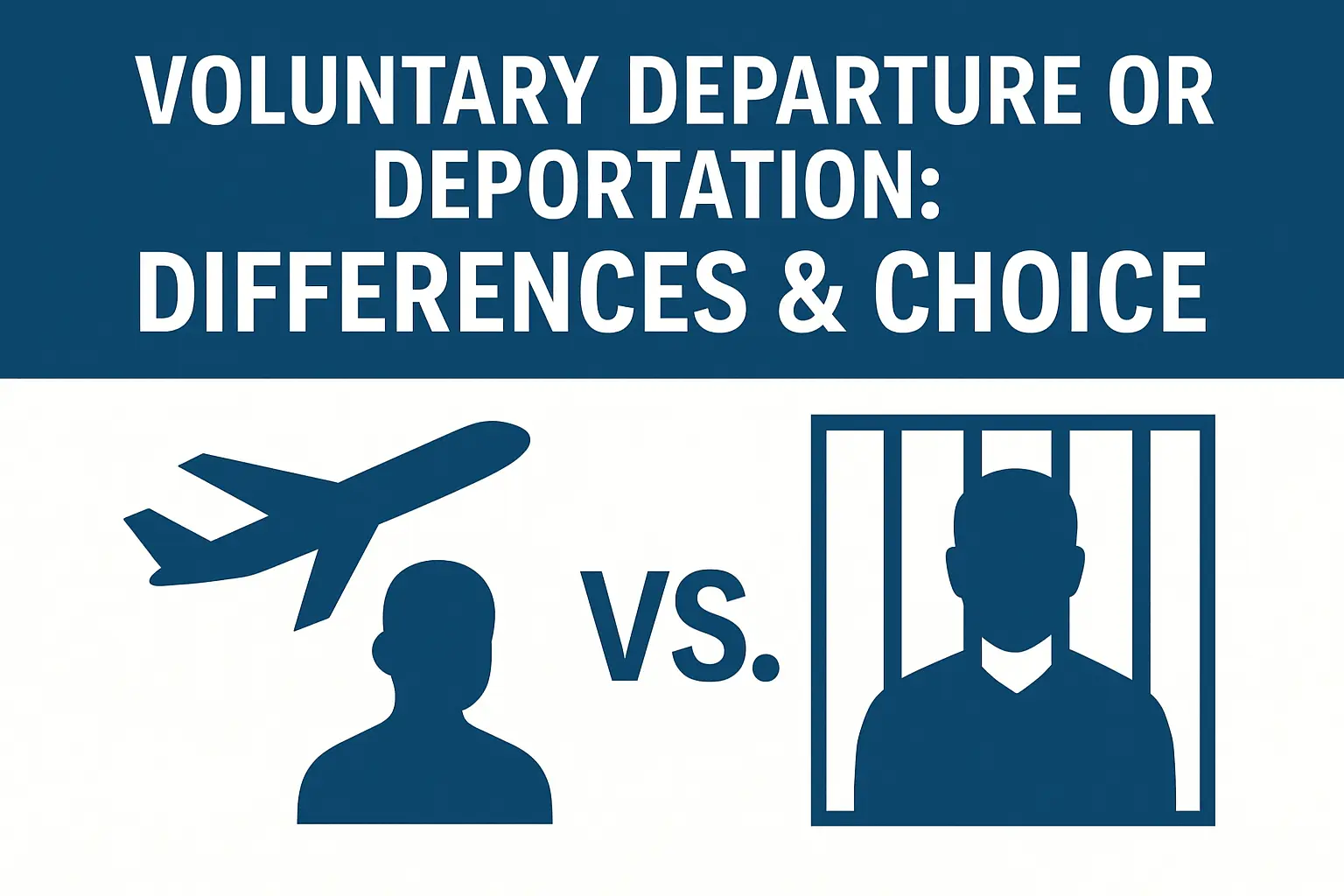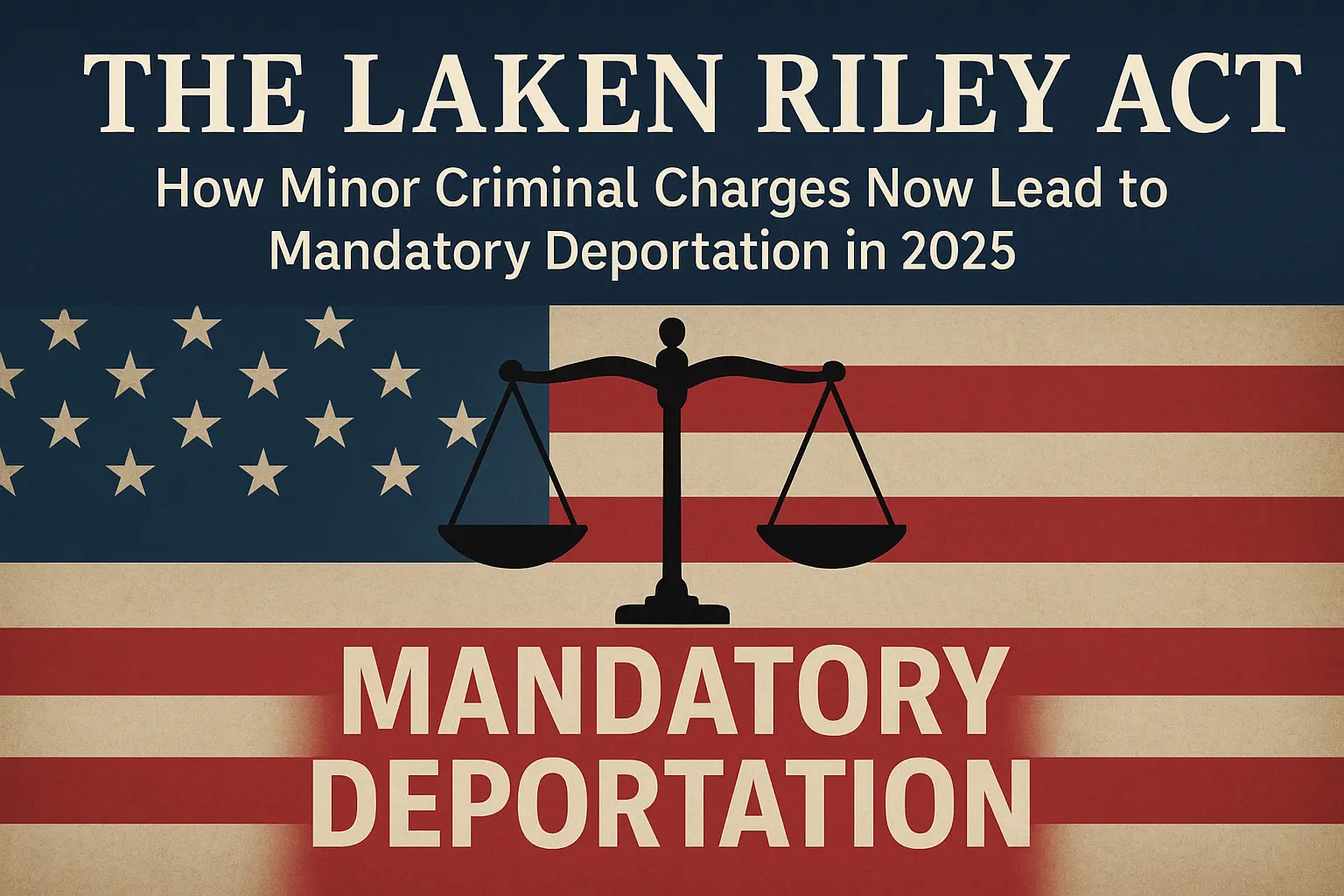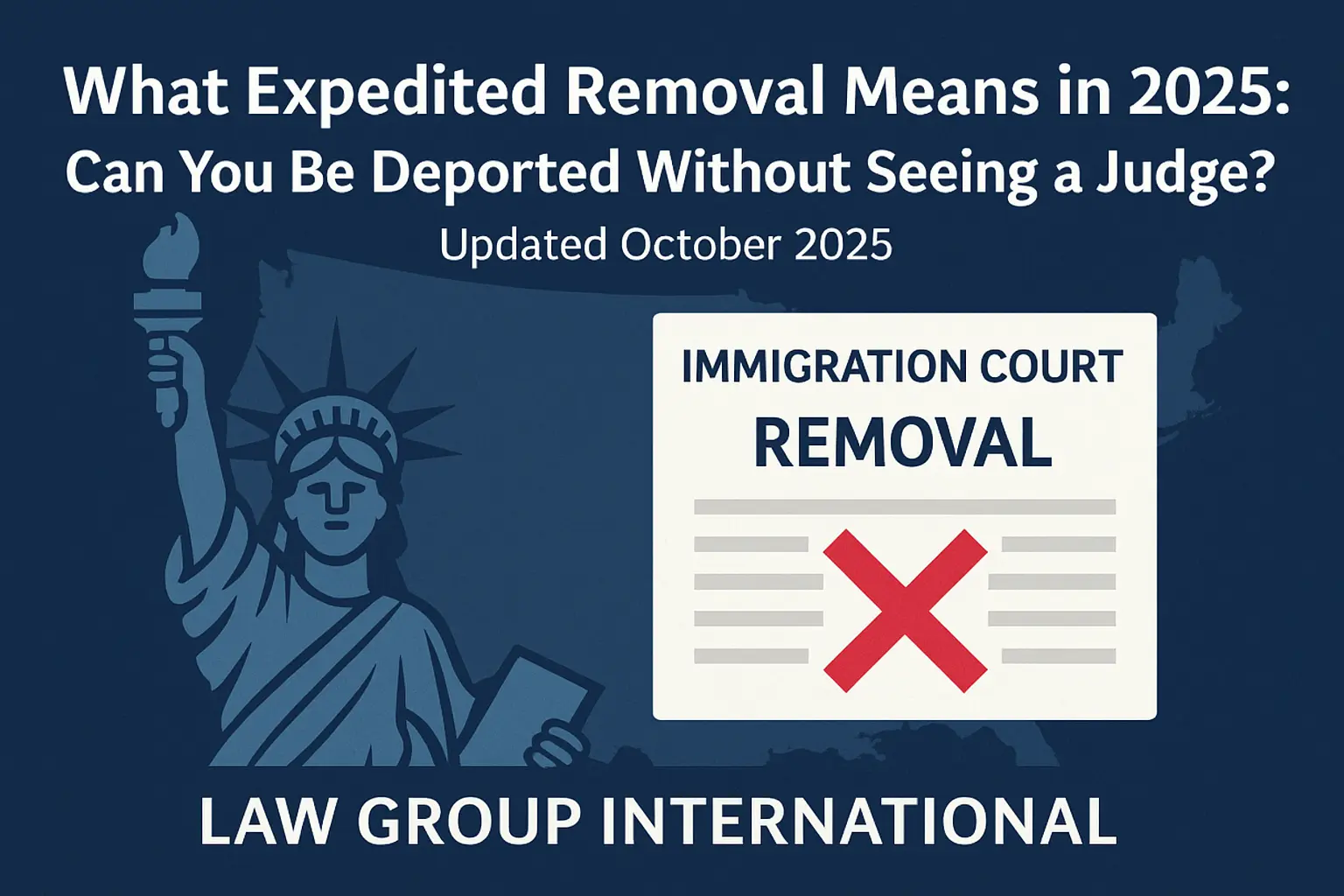Cancellation of Removal for LPRs (INA §240A(a)): Who Qualifies, What Blocks You, and How to Prove It
Updated October 2025
Facing deportation as a lawful permanent resident (LPR) can be confusing and overwhelming. Even long-time green card holders can find themselves in removal proceedings due to past convictions or immigration violations. Fortunately, Cancellation of Removal for LPRs under INA §240A(a) may provide a path to stay in the United States, if you meet the strict requirements and build a strong case.
At Law Group International, our deportation defense attorneys represent LPRs before immigration courts in Virginia, Washington D.C., and across the country, helping clients understand eligibility, avoid legal pitfalls, and prepare solid applications that stand up in court.
The Essentials
To qualify for LPR cancellation, you must show that you:
- Have been a lawful permanent resident for at least 5 years.
- Have 7 years of continuous residence in the U.S. after any lawful admission.
- Have not been convicted of an aggravated felony.
- Merit the judge’s favorable discretion.
(See 8 U.S.C. §1229b(a))
Your 7-year clock can stop in two ways:
- When DHS serves a valid Notice to Appear (NTA) that includes the date and place of your first hearing (Niz-Chavez v. Garland), or
- When you commit certain crimes under INA §212(a)(2), even if you’re not being charged as “inadmissible”, known as the Barton rule (Barton v. Barr).
Certain offenses, called aggravated felonies, permanently bar eligibility for LPR cancellation. Some depend on the length of the sentence (often one year or more). A 364-day plea can make all the difference.
You must apply using Form EOIR-42A, pay the $700 filing fee and $30 biometrics fee, and submit compelling evidence to prove your eligibility and good character.
LPR Cancellation at a Glance (What You Must Prove)
Under INA §240A(a), you must prove all three statutory elements:
- You have been a lawful permanent resident for at least 5 years.
- You have 7 years of continuous residence in the U.S. after any lawful admission.
- You have not been convicted of an aggravated felony.
The 7-year clock starts running after your first lawful admission (for example, when you entered with a visa), not necessarily from when you became a green card holder.
You have the burden of proof to show you meet these requirements and that the judge should grant relief as a matter of discretion (8 CFR §1240.8(d)).
The Two Stop-Time Triggers (and Why They Matter)
1. NTA Service – The Niz-Chavez Rule
If the Notice to Appear (NTA) does not include both the time and place of your first hearing, it does not stop time until DHS later issues a single, complete notice.
This means that some LPRs may still have additional time to reach the 7-year requirement if their NTA was defective.
2. Offense Commission – The Barton Rule
Even if you never received an NTA, your clock can stop the day you commit certain crimes listed in INA §212(a)(2), such as a crime involving moral turpitude (CIMT) or certain controlled-substance offenses.
You don’t need to be charged as “inadmissible” for this rule to apply.
Example: If you entered on January 1, 2017, and committed a qualifying offense on December 30, 2023, your 7-year clock stops that day, even if you’re not charged until later.
Exception: A single offense involving 30 grams or less of marijuana for personal use does not trigger the stop-time rule.
(Barton v. Barr, CLINIC Legal)
Aggravated Felonies: The Absolute Bar
An aggravated felony under INA §101(a)(43) permanently bars LPR cancellation. Examples include:
- Crimes of violence, theft, or burglary with a 1-year sentence.
- Drug trafficking or firearm trafficking.
- Fraud or tax evasion with loss over $10,000.
- Obstruction of justice, perjury, or bribery with a 1-year sentence.
(ILRC Aggravated Felony Chart)
Defense tip: When statutes allow, a 364-day sentence (or less) may avoid the “1-year” aggravated felony definition, an essential plea strategy for immigrant defendants.
Even if the crime isn’t an aggravated felony, it may still:
- Make you deportable under §237, or
- Trigger the stop-time rule if it falls under §212(a)(2).
Relief Windows: When Strategy Counts Most
- Pre-plea: Coordinate with your criminal attorney under Padilla v. Kentucky to avoid aggravated felonies or §212(a)(2) triggers within your first 7 years of residence.
- Pre-NTA: If your 7 years are nearly complete, avoid offenses that might stop time. If DHS serves an NTA, check whether it’s defective under Niz-Chavez.
- Post-conviction relief: If you already have a conviction, vacating or modifying a sentence (when done properly) may restore eligibility, but this must be done carefully and for legal reasons, not just immigration benefits.
Proving Eligibility: Your EOIR-42A Evidence Packet
To apply, file Form EOIR-42A with:
- $700 filing fee
- $30 biometrics fee (as of February 2025)
Recommended Evidence:
- Proof of LPR status (green card, I-797 approval notices).
- Proof of 7 years’ continuous residence (I-94s, tax records, leases, pay stubs, school or medical records).
- Proof of no aggravated felony (certified court records, dispositions).
Organize exhibits using the EOIR Practice Manual, with clear tabs and page numbers. Follow your Immigration Judge’s scheduling order for filing, default timing is 15 days before the Individual Hearing, and responses are due within 10 days unless otherwise ordered.
Winning Discretion: What Persuades Judges
Even if you qualify, cancellation is not automatic. Immigration Judges (IJs) weigh the positive and negative factors based on Matter of Marin and Matter of C-V-T-:
Positive factors:
- Long-term residence and family ties in the U.S.
- Consistent work and tax payments.
- Evidence of rehabilitation and community involvement.
- Genuine remorse and responsibility for past mistakes.
Negative factors:
- Serious or repeated criminal behavior.
- Poor compliance with court orders or probation.
- Lack of rehabilitation or honesty.
A strong rehabilitation package, treatment records, program certificates, letters from employers and faith leaders, can make a decisive difference.
If You’re Ineligible: Other Paths to Explore
Even if you cannot apply for LPR cancellation, other relief options may be available:
- INA §212(h) waiver: May forgive certain crimes for LPRs who were not admitted “as” LPRs before the offense.
- §212(c) relief: For pre–April 1, 1997 pleas.
- Asylum, withholding of removal, or CAT protection for fear-based cases.
- Prosecutorial discretion or deferred action, depending on your circumstances.
FAQs
Does a defective NTA stop time?
No. Under Niz-Chavez, only a single NTA including both date and place stops time.
Can a crime I wasn’t charged with still stop my clock?
Yes. Under Barton v. Barr, committing certain crimes under §212(a)(2) during your first 7 years ends your continuous residence.
What if my sentence was exactly one year?
For crimes that require a 1-year sentence to count as an aggravated felony, you’re likely barred, but you may pursue post-conviction options.
Which form should I file?
Form EOIR-42A – Application for Cancellation of Removal for Certain Permanent Residents.
(EOIR Forms)
How Law Group International Can Help
At Law Group International, we combine precise legal strategy with deep understanding of what’s at stake for you and your family. Our team:
- Calculates your 5-year and 7-year clocks and checks for Barton or Niz-Chavez stop-time issues.
- Reviews your criminal history for aggravated-felony or sentence-length problems.
- Builds persuasive rehabilitation and discretion evidence packages.
- Files complete and timely EOIR-42A applications.
- Represents clients before the Annandale (VA) and Hyattsville (MD) Immigration Courts, the BIA, and the Fourth Circuit Court of Appeals.
If you’re a green card holder facing deportation, don’t wait. Early legal advice can protect your eligibility and improve your chances of staying in the country.
Talk to a Deportation Defense Lawyer Today
Your green card doesn’t automatically protect you from removal—but the law offers a second chance if you act fast.
Law Group International offers:
- Free 15-minute case reviews
- Bilingual attorneys (English, Spanish, Farsi, and Dari)
- Local experience in Virginia, D.C., and the Fourth Circuit
- Personalized strategies for every client
Explore More Immigration Topics
Immigration Policy in 2026
January 1, 2026
Deportations to Venezuela and El Salvador
December 31, 2025
Religious Persecution Asylum
December 30, 2025
Northern Virginia Immigration Court
December 20, 2025
Federal Court Blocks Expanded Rapid Deportations
December 16, 2025
What to Do If ICE Comes to Your Door
December 14, 2025
Voluntary Departure vs. Deportation
December 12, 2025
What expedited removal means
November 19, 2025


